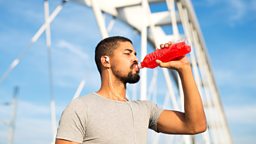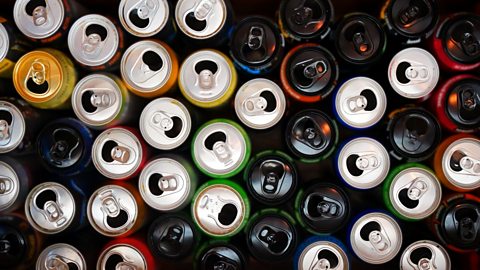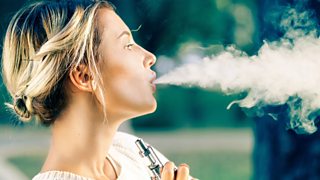Do energy drinks give you more of a boost than coffee or tea?
Sales of energy drinks are rising. But do brands like Monster, Red Bull and Relentless deliver on their promises?
Sliced Bread listener Syed is a consultant radiologist. He wants to know if an energy drink could help him stay on his A-game any better than his usual cup of coffee. He's also keen to know about some of the ingredients they contain – from taurine to guarana. What exactly do they do? And are energy drinks safe to drink?
Presenter Greg Foot speaks to an expert dietician and cardiologist to find out if energy drinks live up to the hype. Are they the best thing since sliced bread – or marketing BS? Here's what Syed needs to consider before switching his cup of coffee for caffeine in a can.

1. High doses of caffeine can make us 'jumpy' rather than focused
Caffeine is a drug. "It has a pharmacological effect on our body," explains registered dietician Dr Duane Mellor. "It increases our arousal so it makes us a little bit more alert."
It's not clear if caffeine makes us alert and 'in the zone', or alert and 'not precise'.Dr Duane Mellor, registered dietician
Consuming caffeine increases cortisol and adrenaline – the 'fight or flight' compounds in our body. However, it's not clear if caffeine makes us alert and 'in the zone', or alert and 'not precise' and 'jumpy'.
"Some people are very sensitive to caffeine. It can increase heart rate and it can actually lead to feelings of palpitations," explains Duane.
2. Some energy drinks contain the recommended daily maximum for a single dose of caffeine
The recommended safe intake of caffeine is 400mg per day, with not more than 200mg in a single dose. A coffee can come in at around 80mg to 120mg, depending on how it’s been brewed: an instant will be at the lower end; a multi-shot espresso much higher.
In comparison, a can of Red Bull contains 80mg, which actually makes it less caffeinated than a strong coffee. The supermarket own brands contain around 70mg or 75mg. However, Monster Original and Relentless Original contain 160mg. And Rockstar Original has a whopping 200mg of caffeine – that’s the recommended max for a single dose.
3. But caffeine may not to be as bad for us as we think
Consultant cardiologist Dr Rohin Francis says we need to think again when it comes to the risks surrounding caffeine and energy drinks.
I think the caffeine in these drinks is being a bit unfairly demonised.Dr Rohin Francis, consultant cardiologist
"We have got good amounts of evidence, over decades, that caffeine is not something that is high risk for the heart," he says. Even in patients with certain cardiac conditions. Studies haven't identified any risk, he says, except at very high doses, "which really no average person’s going to get to."
"I think the caffeine in these drinks is being a bit unfairly demonised."
4. It might be the sugar in energy drinks that poses more of a health risk
However, when it comes to sugar content, it could be a different story. In the 250ml cans there's often 25g to 30g sugar; in the 500ml cans there’s 25g to 55g – or more. And the government's recommendation for added sugar intake is around 45g per day. "You're hitting over that with one can of some of these," says Duane.
If someone is having a high load of very refined sugar, absorbed very rapidly, then that's much more of a concern than the caffeine, says Rohin.
5. Low-sugar versions will be lower risk, but maybe not zero risk
There are many low or zero-sugar energy drink options. And these will be lower risk, says Rohin. "If I could give one tip I'd say, if possible, switch to the zero-sugar version and then I think you're on much more sure ground."
But, although it's good to make a move from sugar to sweeteners, Duane says these may have an effect on our biology, such as our gut microbiome. He suggests unsweetened coffee would be a better choice than a zero-sugar energy drink.

What are the mystery ingredients in energy drinks?
Greg finds out what it is we're drinking with registered dietician Dr Duane Mellor.
6. There's a lack of evidence surrounding the benefits of other ingredients
Duane talks Greg through some of the common energy drink additives:
Taurine is an amino acid that, unlike others, isn't used to make proteins. It's thought to potentially have an effect on our nerves and brain, so it could increase alertness. "But there are a lot of mays and mights," says Duane. "There's no definitive evidence of benefits."
Ginseng is a herbal extract and mild stimulant. It's been associated with a range of health effects, but most of these are based on lab data rather than data in people.
Guarana is a natural source of caffeine. It's just "fancy-dressed caffeine."
L-Carnitine is the shuttle that gets fatty acids into the mitochondria in our cells – the place where we convert the energy in our food "The problem is, we can get [L-Carnitine] into our blood but we can't get it into our cells very easily," says Duane. There's no data to prove it works.
BCAAs stands for branched-chain amino acids. These are essential for the body but the average diet already contains plenty of them. There are claims it can improve muscle recovery and fatigue but "there is no proven link."
Electrolytes can be helpful. If we want our body to take water in then we need sodium, for example. But the other electrolyte we find in modern sports drinks is potassium and this might actually have an adverse effect: it doesn't have that water uptake and could lead to diarrhoea.
We need more research done into these often novel ingredients, suggests Rohin. We don't have a huge body of evidence about whether they help or hinder.
7. Some professional bodies now suggest energy drinks can have an adverse effect
The British Medical Journal highlighted the case of a 21-year-old man who drank four 500ml cans of energy drink a day for around two years and suffered a severe heart failure.
We have data for long-term benefits for drinking coffee, we don't have data for long-term benefits of energy drinks.Dr Duane Mellor, registered dietician
"There are enough factors about energy drinks that make me slightly concerned," says Rohin, "and part of that is the other ingredients in these drinks." Comparable caffeine intake in the form of tea and coffee hasn't led to the same case reports and anecdotal adverse outcomes. "Some of the professional bodies have updated their guidelines to suggest that energy drinks can have an adverse outcome."
Although the cardiologist doesn’t think drinking them is as harmful as some make out, he "would exercise caution and not do it too often".
8. The experts would still opt for a coffee
Neither expert believes there are benefits to imbibing an energy drink over a sugary coffee.
"If the choice is given to me of coffee or tea versus an energy drink – and obviously there's a lot of cultural baggage wrapped up in that decision as well – there's no chance I would select an energy drink over a nice cup of coffee or nice earl grey tea," says Rohin.
Duane thinks there's a lot more marketing than actual benefits. "We have data for long-term benefits for drinking coffee," says the dietician. "We don't have data for long-term benefits of drinking energy drinks."
To hear Greg's full findings and learn whether Syed is going to reach for an energy drink rather than his afternoon 'coffee one sugar', have a listen here.
Listen to more episodes in the series here.
The information contained in this article was correct at the time of broadcast on 19 January, 2023.

More articles from Radio 4
-
![]()
How did e-cigarettes and vaping get so popular?
Tracing the history and extraordinary growth of e-cigarettes.
-
![]()
What's the best way to heat a room this winter?
Greg Foot gets cosy with different kinds of portable home heating options – or space heaters.
-
![]()
Can cooking with an air fryer save you money?
Find out how air fryers work, and whether they are healthier than other cooking methods.
-
![]()
How spending time in nature could boost your body and mind
In Just One Thing, Michael Mosley explores the positive effects of spending time in nature.





